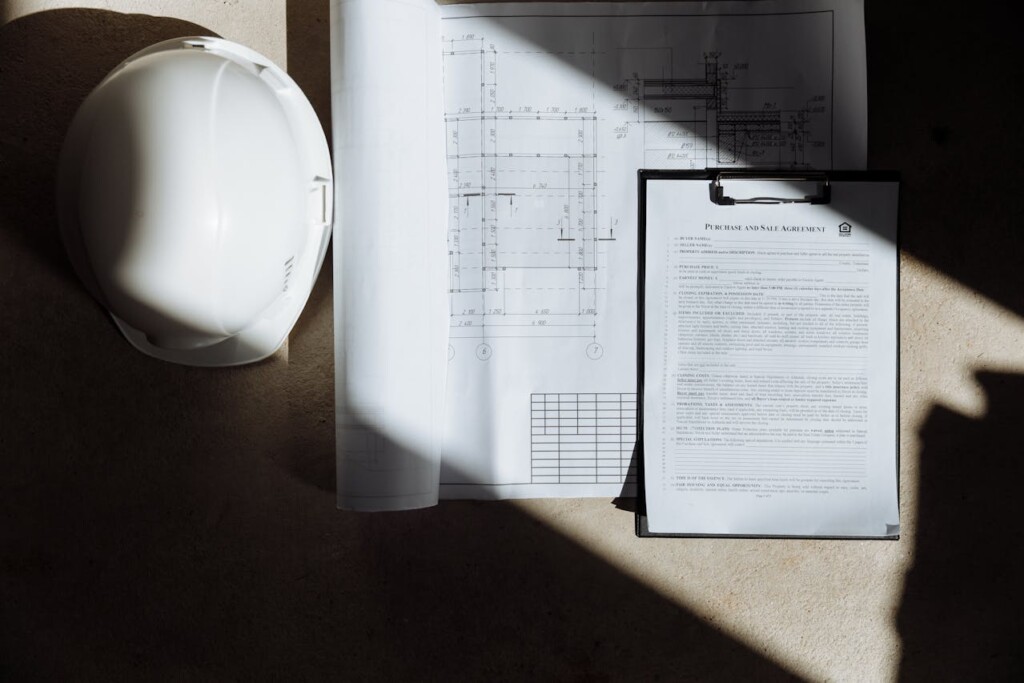Modern commercial projects demand efficiency and accountability from day one. When property owners face tight deadlines and complex build requirements, managing multiple contractors, designers, and vendors becomes a logistical nightmare that often derails both schedules and budgets.
Turnkey commercial construction is a project delivery method where one contractor manages the entire build from concept to handover. We handle architectural design and engineering, permitting, procurement, construction, and commissioning under a single contract. The facility arrives ready for immediate use, allowing owners to literally turn the key and begin operations.
What Phases And Components Are Typically Included?

A turnkey commercial construction project follows a structured sequence of activities from initial concept through final delivery. Each phase builds on the previous one, ensuring comprehensive project development while maintaining accountability through a single contractor. We organize these components to streamline coordination and minimize gaps that could delay project completion.
Pre-Planning And Feasibility Assessment
The project begins with defining scope boundaries and conducting thorough cost analysis. We evaluate site conditions, zoning requirements, and potential environmental concerns that could impact construction feasibility. This foundation work helps establish realistic budgets and timelines before moving forward with detailed design.
Risk assessment forms a critical component of this initial phase. We identify potential challenges ranging from soil conditions to utility availability, ensuring these factors are addressed in project planning rather than discovered during construction.
Detailed Design And Engineering Development
Engineering teams develop comprehensive drawings and technical specifications aligned with operational requirements. We coordinate architectural elements with structural, mechanical, and electrical systems to create integrated designs. This collaboration prevents conflicts between building systems that often surface during construction.
Design development includes value engineering to optimize costs while meeting performance standards. We review material selections, construction methods, and system configurations to balance initial investment with long-term operational efficiency.
Permitting And Regulatory Compliance
Securing necessary approvals involves navigating local building codes, zoning regulations, and environmental requirements. We manage the permit application process, working directly with municipal authorities to address questions and revisions. This coordination ensures compliance without delaying project schedules.
Environmental reviews may require additional documentation depending on project location and scope. We handle these regulatory requirements as part of our comprehensive service, reducing owner involvement in complex approval processes.
Procurement And Subcontractor Selection
Material sourcing begins with establishing supplier relationships and securing pricing commitments. We select subcontractors based on experience, capacity, and track record with similar projects. Delivery scheduling coordinates with construction sequences to minimize storage requirements and material handling.
Contract negotiations with trade partners establish clear expectations for quality, schedule, and safety performance. We maintain accountability through these relationships while owners benefit from our established vendor networks.
Construction Management And Quality Oversight
Active construction involves coordinating multiple trades while maintaining schedule momentum and quality standards. We oversee daily site activities, manage material deliveries, and conduct regular inspections to ensure work meets specifications. Progress reporting keeps owners informed without requiring constant site presence.
Safety protocols and quality controls operate throughout construction activities. We implement systematic inspection procedures and documentation requirements that support both immediate construction needs and future facility operations.
Testing, Commissioning, And System Integration
System verification confirms that mechanical, electrical, and technology components function as designed. We coordinate commissioning activities with equipment manufacturers and utility providers to ensure proper installation and startup procedures. Performance testing validates that building systems meet design specifications before occupancy.
Utilities connections require coordination with local service providers for power, water, sewer, and telecommunications. We manage these tie-ins to align with project schedules and ensure services are available for facility operations.
Documentation And Facility Handover
Final delivery includes comprehensive as-built drawings reflecting actual construction conditions. We provide operation manuals, warranty documentation, and maintenance schedules for building systems and equipment. This documentation package supports efficient facility management and helps owners understand their new facility.
Training sessions familiarize facility personnel with building systems and maintenance requirements. We ensure smooth transitions from construction to operations through comprehensive handover procedures.
Post-Delivery Support And Performance Monitoring
Warranty coverage addresses any issues that emerge after facility delivery, with defined response times and resolution procedures. We conduct follow-up inspections to confirm system performance and address any adjustments needed during initial operations. This ongoing support ensures facilities perform as intended throughout warranty periods.
What Are The Benefits And Trade-Offs For Owners?
Turnkey commercial construction delivers measurable advantages that directly impact project outcomes for property owners and developers. We structure these projects to provide clear benefits while acknowledging the inherent limitations that come with integrated delivery methods.
Primary Benefits For Property Owners
Faster timelines emerge as the most significant advantage of turnkey delivery. We manage design and construction phases concurrently rather than sequentially, compressing overall project schedules. This integrated approach eliminates the delays typically associated with separate design completion, bidding processes, and construction startup phases.
Cost certainty provides owners with predictable financial planning throughout the project lifecycle. We establish fixed-price contracts that define total project costs upfront, reducing exposure to budget overruns. Fewer change orders result from our early involvement in design decisions, as we identify and resolve constructability issues before they impact the construction phase.
Single point of contact streamlines communication and decision-making processes. Owners work directly with our project team rather than coordinating between separate design and construction entities. This unified communication pathway reduces misunderstandings and accelerates response times when project decisions are required.
Minimized client risk occurs through centralized responsibility for all project phases. We assume liability for design errors, construction defects, and coordination failures that might otherwise create disputes between separate contractors. This risk transfer provides owners with clear recourse and protection throughout the project.
Key Trade-Offs To Consider
Less flexibility to change scope or design becomes evident after contract execution. The integrated nature of turnkey delivery makes significant modifications more complex and costly than in traditional delivery methods. Late-stage changes require adjustments to both design and construction elements simultaneously, creating schedule and budget impacts.
Initial price may exceed traditional delivery methods due to the comprehensive nature of turnkey contracts. We include contingencies for design development risks and integration challenges that owners might otherwise manage separately. However, research indicates that total project costs often remain competitive due to reduced change orders and schedule acceleration.
Budget control shifts from the owner to our project team, which some clients find uncomfortable. While we provide regular cost reporting and maintain transparency, owners have less direct influence over individual procurement and subcontractor selection decisions. This trade-off comes with the benefit of professional cost management expertise applied throughout the project.
How Does Turnkey Compare To Separate Contracting And EPC?

Turnkey Versus Separate Contracting
Separate contracting places full coordination responsibility on the property owner. You hire individual firms for design, engineering, construction, and specialty trades. Each contractor reports directly to you rather than coordinating with each other. This approach requires extensive vendor coordination and project management from your team.
The coordination burden increases project complexity significantly. Design teams may create plans that construction crews find impractical to build. Procurement schedules often conflict with construction timelines. When delays occur, determining responsibility becomes difficult since multiple parties control different aspects of the work.
Turnkey delivery consolidates these responsibilities under one contractor. We manage all design, procurement, and construction activities internally. This single point of accountability eliminates coordination gaps and reduces the likelihood of cost overruns or schedule delays. Risk allocation shifts from the owner to the contractor, who assumes responsibility for project performance.
Turnkey Versus EPC Contracting
Both turnkey and engineering procurement construction contracts assign complete project responsibility to one entity. The contractor handles design development, material sourcing, and construction management. Both approaches transfer technical and financial risk from the owner to the contractor.
EPC contracts typically provide more client involvement during design and supplier selection phases. The owner maintains greater influence over engineering decisions and can approve key equipment purchases. This structure works well when owners have technical expertise and want to guide specific project elements.
Turnkey arrangements emphasize minimal client involvement and maximum schedule efficiency. Owners receive regular progress updates but delegate daily decision-making to the contractor. This approach suits busy developers and property owners who prefer defined pricing and completion dates without extensive project oversight.
| Aspect | EPC | Turnkey | Separate Contracting |
|---|---|---|---|
| Scope of Work | Contractor handles design, procurement, construction, and commissioning | Contractor oversees concept to handover; project is ready for use | Different entities manage individual phases: design, procurement, construction |
| Client Involvement | More client involvement in design and supplier selection | Minimal client involvement; delegated daily decision-making | High client involvement required for coordination |
| Risk Allocation | Significant risk transferred to contractor | Contractor assumes risks for design errors, construction defects | Higher risk on client for coordination and integration issues |
| Cost Structure | Fixed-price agreements but accommodates design modifications (in early phases) | Fixed-price contracts with limited scope changes post-construction initiation | Varies by contract with potential for cost changes due to separate agreements |
| Project Coordination | Managed by contractor, ensuring streamlined delivery | Single accountability eliminates coordination gaps | Owner must coordinate between diverse contractors |
Both EPC and turnkey models use fixed-price agreements to provide cost certainty. The contractor absorbs material cost increases, labor shortages, and schedule pressures. However, turnkey contracts often include stricter limitations on scope changes once construction begins, while EPC agreements may accommodate more design modifications during early phases.
How Are Risk And Quality Managed In Turnkey Delivery?
Effective risk management and quality assurance form the backbone of successful turnkey commercial construction. We approach both elements systematically, building controls into every phase of the project delivery process.
Risk Management Framework
Early risk identification drives our approach to turnkey project management. We assess each potential risk by examining its likelihood of occurrence and measuring its potential impact on schedule, budget, or quality outcomes. This systematic ranking allows us to prioritize our response efforts where they matter most.
Our mitigation strategy combines multiple layers of protection. We develop comprehensive mitigation plans that address specific risk scenarios, maintain appropriate insurance coverage for project-related liabilities, and establish contingency reserves to handle unexpected costs. These financial safeguards provide the flexibility needed when unforeseen challenges arise during construction.
Ongoing monitoring ensures our risk management remains effective throughout the project lifecycle. We track key performance indicators that signal emerging risks before they become critical issues. Regular plan reviews with all stakeholders maintain open communication channels and allow for real-time adjustments to our risk response strategies. Contract clauses provide additional protection by clearly defining how specific risks are allocated between parties or transferred to specialized providers.
Quality Assurance Implementation
Quality control begins during the design and feasibility phases, long before construction starts. Accurate design work and thorough feasibility studies establish the foundation for quality outcomes. These early investments prevent costly modifications and ensure all systems integrate properly from the start.
Supplier selection and materials verification form critical quality checkpoints. We evaluate suppliers based on their track record, certifications, and ability to meet project specifications. Regular materials audits verify that incoming materials meet specified standards before they enter the construction process.
Real-time quality monitoring continues throughout construction. We perform systematic inspections at predetermined intervals and maintain continuous oversight of critical construction activities. This approach catches potential quality issues while they can still be corrected efficiently, preventing defects from compounding through later phases.
Testing and commissioning provide the final quality verification before handover. We test all building systems under actual operating conditions to confirm they perform as designed. This comprehensive commissioning process includes utilities tie-ins, equipment performance validation, and system integration testing.
Documentation and quality system compliance complete our quality assurance framework. We provide detailed as-built documentation, operation manuals, and maintenance schedules that support long-term facility performance. Our quality processes align with established standards such as ISO 9001, ensuring consistent application of quality management principles throughout the project.
Conclusion And Next Steps

Turnkey commercial construction offers a straightforward path to facility completion through single responsibility management. We handle every phase from initial planning through commissioning, delivering a ready-to-use building where you can literally turn the key and begin operations. This approach speeds delivery timelines, provides cost certainty through fixed-price contracts, and reduces coordination risk by eliminating the need to manage multiple contractors across different project phases.
However, this model requires careful consideration of its constraints. The fixed-price structure and integrated delivery method limit flexibility for late-stage changes once contracts are signed. Initial pricing may appear higher compared to traditional approaches, though this often reflects the comprehensive risk transfer and coordination benefits included in the package. Owners must also accept reduced day-to-day control in exchange for streamlined project management and accelerated delivery schedules.
Ready to explore turnkey commercial construction for your next project? Contact EB3 to discuss how our integrated approach can deliver your facility on schedule and within budget.




